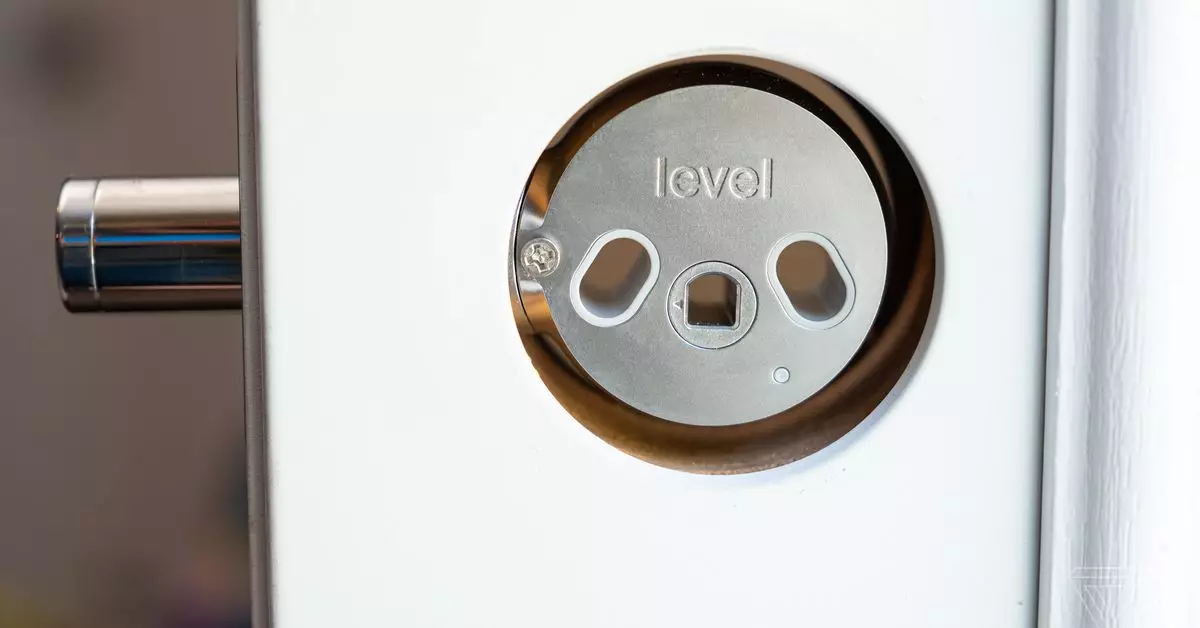The market for smart locks may currently be seen as a niche segment in the broader realm of home technology, but significant developments suggest a pivotal shift. Key players in the industry are preparing to capitalize on the growing interest in connected gadgets. Assa Abloy, a dominant entity in the lock manufacturing sector, has made waves with its recent acquisition of Level Lock, a sleek and innovative smart lock maker. This move not only augments Assa Abloy’s extensive portfolio but also hints at the company’s commitment to shaping the future of access control technology.
Assa Abloy is known for its vast ownership of nearly 190 brands focused on access control solutions. Yet, its aggressive expansion into the smart lock domain has not been without scrutiny. The US Department of Justice has raised concerns about Assa Abloy’s acquisitions, warning that such consolidation of power could harm competition. However, the recent purchase of Level Lock illustrates the company’s determination to embrace a digital future for security locksmithing.
What stands out about Level’s product line is its unique approach to design. Unlike traditional smart locks that often feature bulky casings, Level’s smart locks seamlessly integrate digital functionalities into standard deadbolts. The result is a product that caters to homeowners who desire convenience without sacrificing aesthetic appeal. With features like touch-to-unlock and compatibility with Apple Home Key, Level’s offerings present a refined alternative to the dominant designs currently saturating the market.
Assa Abloy has a notable history of successfully incorporating cutting-edge technologies into its legacy brands. When it previously acquired August, it effectively integrated the auto-unlocking technology into Yale’s offerings, which helped maintain a competitive edge. The company’s acquisition of Level locks presents a similar opportunity. Looking ahead, the initiative to blend Level’s technology with widely recognized brands like Kwikset is a strategic one. By developing smart locks that retain a classic appearance, Assa Abloy could facilitate a smoother transition for consumers reluctant to embrace connected technology.
Moreover, the company’s persistence in maintaining its identity while evolving technologically should not be overlooked. Even though it lost ownership of August and had to divide its Yale brand due to regulatory constraints, its focus on technological integration appears unwavering. The acquisition of Level is likely to follow a similar pattern, resulting in the amalgamation of Level’s expertise into Assa Abloy’s broader strategy.
The competitive landscape for smart locks has always been fierce, with Assa Abloy holding a substantial market share. The Department of Justice has intervened previously, indicating concerns regarding the monopoly-like position of Assa Abloy if it were to dominate the market through acquisitions entirely. This regulatory scrutiny reflects broader anxieties about corporate consolidation stifling innovation and limiting consumer choice.
Nevertheless, the recent success of companies like Level Lock, which reported sales characterized by modest growth, points to a diverse marketplace still ripe with potential. Even as Level’s price point and limited compatibility have hindered its expansion, its patents and technology make it an attractive target for Assa Abloy. Whether this new acquisition accelerates Assa Abloy’s control over a burgeoning sector without further antagonizing regulatory bodies remains to be seen.
Innovative enhancements in the smart lock industry are on the horizon, particularly concerning how users interact with their locks. The “Aliro” access control standard, currently being developed in a collaborative effort involving industry players like Apple and Google, aims to revolutionize user experience. This standard is designed to offer a seamless means of unlocking doors using smartphones and smartwatches. The notion of simply tapping your device to gain entry, regardless of lock brand or type, is a dream for many consumers.
Assa Abloy is already committed to the Matter connectivity standard, placing it at the forefront of emerging technological trends in the smart home sector. The combination of Matter and Aliro presents a unique opportunity for Assa Abloy to leverage its recent acquisitions, including Level, ensuring that its products remain relevant and competitive as the industry evolves.
The convergence of traditional locking mechanisms with digital innovation epitomizes the future of home security. Assa Abloy’s strategic acquisitions reveal both ambition and a strong willingness to innovate while navigating regulatory challenges. By aligning its developments with advancements such as Aliro and Matter, the company is poised to not only lead the market but also redefine user experience in residential security.
While there remain concerns about market concentration and regulatory pushback, the company’s ability to effectively integrate advanced technologies with trusted brands suggests a bright future for smart locks—one that prioritizes seamless functionality and aesthetic integrity. As Assa Abloy advances, the ambition to make smart locks more accessible and appealing is clear, potentially changing the way homeowners perceive and engage with home security solutions.

